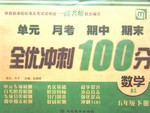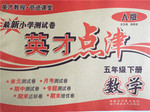题目内容
任务型阅读
阅读下列短文,完成任务A和B。
Introduction to invitations(邀请活动简介)
Invitations are important. In the west, people often give invitations to their friends. Most invitations are for dinner or a birthday party. When people accept(接受)an invitation to a dinner or party, they usually ask what they can bring. They often take flowers, chocolates, or other presents. People usually take a birthday present to a birthday party. After a dinner or birthday party , most people telephone the host(主人)to say “thank you”. Some people write a short thank-you note or send an e-mail to the host.
任务A:Mary想邀请James参加生日晚会,请将以下各项活动按正确的顺序排列,把序号填入相应的横线上。
A. Mary and James enjoy the party together.
B. James accepts the invitation.
C. James writes a thank-you note.
D. James brings a birthday present.
E. Mary invites her friend James to her birthday party.
1._______2.________ 3.__________4.__________
任务B:请你帮James 给Mary 写一句表示感谢的话。
5._______________________________________.
1.B
2.D
3.A
4.C
5.Thank you for your invitation . / Thanks for inviting me to your party.
【解析】
试题分析:这篇文章讲述的在西方,人们通常邀请他们的朋友参加他们的生日聚会或者晚宴。
1.玛丽邀请她的朋友詹姆斯参加她的生日聚会,詹姆斯接受了她的邀请。故选B
2.詹姆斯参加聚会时,给玛丽带了一份礼物。故选D
3.他们在生日聚会上玩的很开心。故选A
4.聚会结束后,詹姆斯给玛丽写了一份感谢条。故选D
5.詹姆斯给玛丽写的感谢语:谢谢你的邀请/谢谢你邀请我参加你的生日聚会。
考点:社会现象类说明文
点评:对于此类题型的解答,可以将整个文段首先浏览一遍,大概理解意思。答题过程中,根据所提供的答语或是后文进行作答,同时,做题过程中根据文章的叙述顺序,结合选项进行作答,答完后注意通读检查是否符合逻辑,语义顺畅。

 全优冲刺100分系列答案
全优冲刺100分系列答案 英才点津系列答案
英才点津系列答案任务型阅读,阅读下列短文,根据要求完成下列题目。(10分)
Miss Li is my favourite teacher. (A)She began to teach us Chinese three years ago. She is a young girl with long, black hair and a beautiful smile. When she came to our school, I was not a good student in our class. I always failed(没有通过) the tests.
Miss Li spent a lot of time with our class, but I never had a chance to talk to her. I thought I was just nobody in my class and Miss Li didn’t like me. But I knew I was wrong later.
One day, Miss Li asked me to meet her at the school gate. When I got there, she was waiting for me already. Then we went to the park in the school together. (B)Talking alone with my teacher made me excited. She smiled at me and told me that I was quiet but I could write wonderful stories. She told me that I could be a good student.
Today, Miss Li doesn’t teach us any more, but I still want to say that she taught me the most important lesson of my life: to believe in myself.
【小题1】将文中A处画线句子用现在完成时改写。
______________________________________
【小题2】写出文中B处画线句子的同义句。
It made me excited ____________________with my teacher.
【小题3】The underlined word “nobody” may mean _________.
| A.an important person | B.an interesting person |
| C.an unimportant person | D.a boring person |
______________________________________
【小题5】What did Miss Li say the writer was good at?
______________________________________
任务型阅读
阅读下列短文,根据短文中的信息完成文后表格。在答题卡标有题号的横线上,写出空缺处所填单词的正确形式。(每空一词)
Recently, the relationship between the two countries got worse because of the Diaoyu Islands.
The Japanese government signed a contract(合同) on Sep 11 with the Kurihara family. It was to pay the so-called “private(私人的) owner” 2.05 billion yen (166 million yuan) to “buy” part of China’s Diaoyu Islands.
Anti-Japan(反日) feeling grew strongly among Chinese people. Many people walked into the streets and shouted out “Diaoyu Islands are China’s.” Some have decided not to buy Japanese products any more. “I am boycotting(抵制) Japanese goods as a show of support. I’ll work hard to make the country much stronger,” Liu Xiushan, 33, a lawyer in Beijing said to China Daily.
However, some didn’t show their anger in the right way. They broke cars and stores of Japanese brands. Some used rude words. These actions are bad for our position and image. Some actions were against law.
Li Jingjun, a 17-year-old high school student in Guangzhou, was shocked by what he learned from TV and the Internet. He joined protects(抗议) in his city on September 15. But he acted differently. He called for rational (理智的) actions.
“We have every right to say the Diaoyu Islands belong to us, but we should watch our behaviour. Bad manners can harm our dignity(尊严) and sense of justice(正义感)” ,said Li Jingjun.
|
The event |
The Japanese 1. signed a contract to “buy” part of China’s Diaoyu Islands. |
|
The 2. |
The relationship between the two countries 3. worse. |
|
Anti-Japan feeling grew strongly 4. Chinese people, many people walked into streets, 5. “Diaoyu Islands are China’s.” |
|
|
Some people have 6. to buy Japanese products. |
|
|
Some people did something against the law like 7. cars and stores of Japanese brands.. |
|
|
The conclusion |
8. we have every right to say the Diaoyu Islands belong to us, we should under the law and watch 9. we do. What’s more, we should make our country10. . |